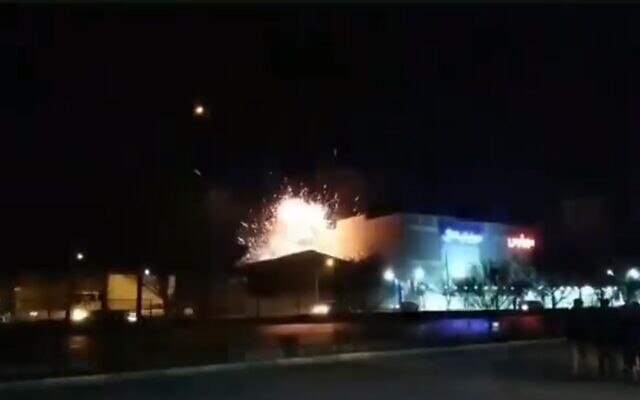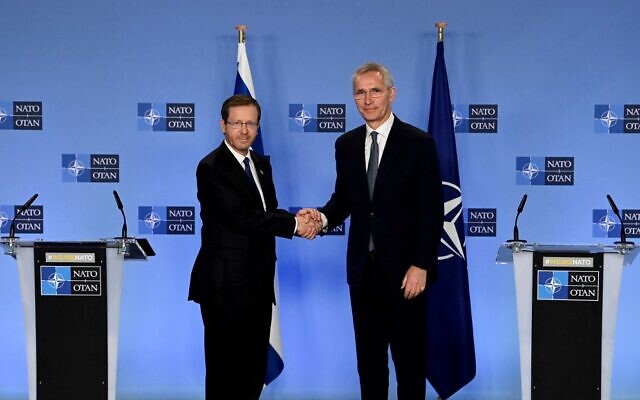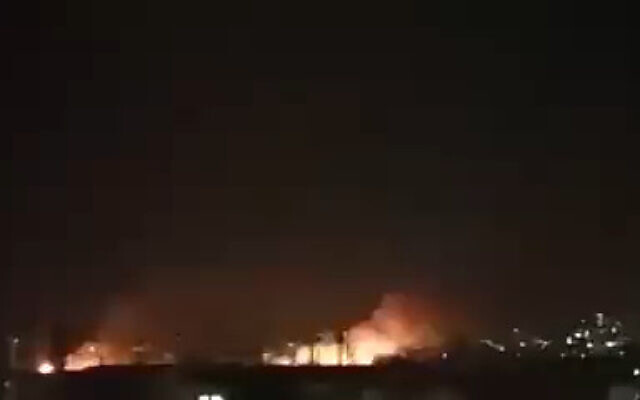Iran has for the first time officially blamed Israel for a drone strike on a key defense facility in the city of Isfahan, filing a complaint with the United Nations Security Council about the “terrorist attack” launched by the Jewish state and saying it reserves its “legitimate and inherent right” to retaliate.
In the letter sent Wednesday and published Thursday, Iranian Ambassador Amir Saeid Iravani said he wanted to draw the UN’s attention to “further instances of the Israeli regime’s acts of terrorism and sabotage as well as violations of international law against the Islamic Republic of Iran.”
The letter said that on Saturday, “an attempt was made to launch a terrorist attack against a workshop complex of the Iranian Defence Ministry in the city of Isfahan.”
It claimed that three micro-drones were launched, with two being intercepted. “Early investigations suggest that the Israeli regime was behind this attempted act of aggression.”
The site hit in Saturday’s strike was reportedly a weapons production facility for Iran’s killer Shahed-136 drones, which it has supplied to Russia for use in its war against Ukraine.
Get The Times of Israel's Daily Edition by email and never miss our top stories
The New York Times reported Sunday that the drone attack was carried out by Israel to protect its own security interests, and not to prevent the export of Iranian weapons to Russia.

Screen grab from an unverified video circulating on social media said to show explosion at a defense facility in Iran’s Isfahan after an alleged drone strike, January 28, 2023. (Used in accordance with Clause 27a of the Copyright Law)
The strike was carried out by the Mossad intelligence agency, according to the newspaper, which cited senior United States intelligence officials.
The report noted that Isfahan is a hub for Tehran’s missile industry, and is where the Shahab medium-range missile — which has a range capable of hitting Israel — is assembled.
Israel has not commented on the strike.
The letter to the UN marks the first time Iran openly blamed Jerusalem for the attack. Previously, unnamed officials told the Al Jazeera network that it appeared Israel was behind the attack, although they claimed it was a failure.
The Iranian official threatened that Tehran would seek revenge: “Israel knows very well that it will receive a response, as happened in the past.”
Wednesday’s letter to the UN also complained about recent statements from senior Israeli officials, including President Isaac Herzog, former IDF chief of staff Aviv Kohavi and Prime Minister Benjamin Netanyahu.
Herzog was singled out for calling on NATO to take greater steps to combat Iran’s nuclear drive, while Netanyahu and Kohavi were criticized for saying that Israel was preparing the means to militarily stop Iran from acquiring a bomb.

President Isaac Herzog (L) and NATO Secretary general Jens Stoltenberg at a press conference following their meeting at the NATO Headquarters in Brussels on January 26, 2023. (John Thys/AFP)
The letter calls on the UN to condemn “Israel’s warmongering statements and acts of terrorism.”
It also says Iran reserves “its legitimate and inherent right to defend its national security and respond resolutely to any threats by the Israeli regime, wherever and whenever deemed necessary.”
On Monday, the Kan public broadcaster reported that the Israeli security establishment was bracing for a retaliatory strike by Iran.
The report said that security officials have held discussions to try to predict when and how Iran will respond to several strikes on convoys that reportedly were ferrying weapons and ammunition for Tehran-backed militias in Syria over the past 48 hours. Those airstrikes followed the more significant drone strike on Isfahan.
The series of attacks were widely attributed to Israel, which has a policy of not commenting on such operations.
In addition to retaliatory attacks against targets inside Israel, the security establishment was readying for the possibility that the Islamic Republic would take aim at Israeli tourists, officials, and embassies abroad, or at Israeli-owned shipping tankers, Kan reported without citing sources.
This was the case last year following the assassination of a senior officer in the Islamic Revolutionary Guard Corps. Israel issued a travel warning urging citizens to avoid traveling to Turkey and authorities there said they foiled an attempt by an Iranian cell to stage a kidnapping in Istanbul.

A fire is seen burning, purportedly at the al-Qaim crossing on the Syria-Iraq border, in unverified footage posted online, January 29, 2023. (Screenshot: Twitter)
Iran is believed to have launched drone attacks in the past on US troops and their allies in Syria in retaliation to alleged Israeli strikes targeting Tehran’s interests.
During his previous term as prime minister, Netanyahu ordered numerous strikes on Iranian targets in Syria and operations on Iranian soil. He has been open about his intention to oppose Tehran’s nuclear aspirations at any cost, as Israel generally views an Iranian nuclear bomb as a near-existential threat.
Tzachi Hanegbi, who has since been tapped as National Security Council chairman, said in a November interview that he believed the prime minister would order a strike on Iran’s nuclear facilities if the US did not secure a new nuclear deal with Tehran and failed to take action itself in the near future.


